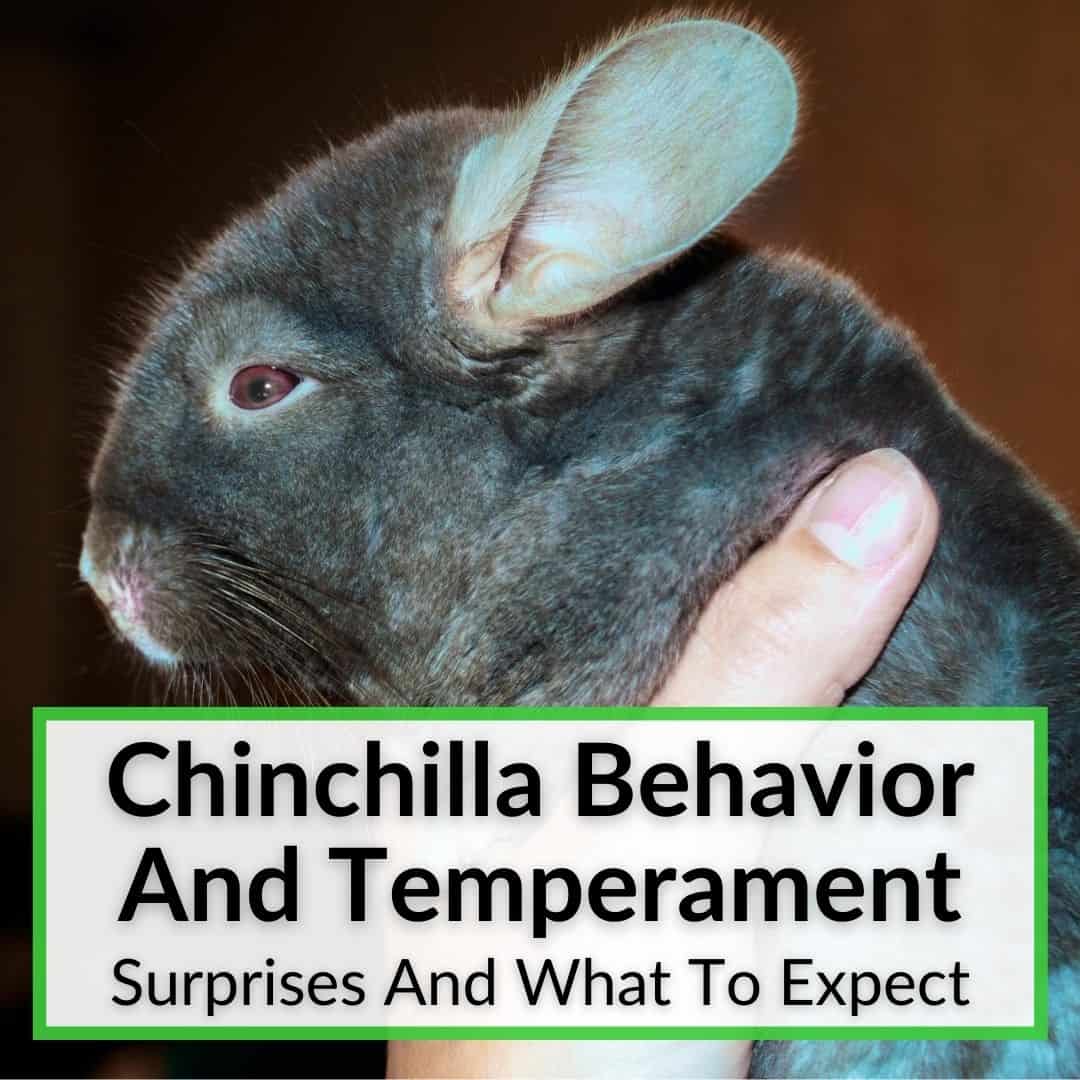
Then you’ll want to gain a basic understanding of chinchilla behavior and temperament as soon as possible.
This will make your life so much easier.
Chinchillas are unique and they can make amazing family pets.
But only if you understanding their behavior.
Keep reading to learn everything you need to know about a chinchilla’s temperament and behavior.
Contents
- 1 Chinchilla Behavior And Temperament
- 1.1 A Quick Video On Chinchilla Behaviors And Temperaments
- 1.2 Chinchilla Personality Traits
- 1.3 A Chinchilla’s Temperature Must Be Monitored
- 1.4 Chewing And Biting
- 1.5 Don’t Allow Your Chinchilla Around Loose Wires
- 1.6 Are Chinchillas Aggressive?
- 1.7 Natural Abilities And What Chinchillas Prefer To Do
- 1.8 Chinchillas Are Easy to Care For, But Always Be Cautious
- 2 Affection, Love And The Bond You Can Form
- 3 Behavioral Difference Between Males And Females
- 4 Bad Behaviors A Chinchilla May Display
- 5 Sleeping Behaviors With Chinchillas
- 6 Happy Chinchilla Behavior And How To Recognize It
- 7 How To Provide Adequate Care For Your Chinchilla
- 8 Chinchillas Are Unique And Smart Animals
- 9 Chinchilla Behavior And Temperament: Final Thoughts
Chinchilla Behavior And Temperament
Now that I have you all pumped up and ready to learn, it’s time to dive straight into how a chinchilla is likely to behave.
The first and most important thing to understand about chinchillas is where they originate and why they have some of the unique personality traits that they possess.
Chinchillas come from the Andes Mountains but also have lived in other geographical areas of Bolivia, Peru, and Argentina.
Chinchillas are not hunters in any form. Quite the opposite. Chinchillas are hunted.
This makes it easy to understand that when you first get them home, they are very skittish and scared.
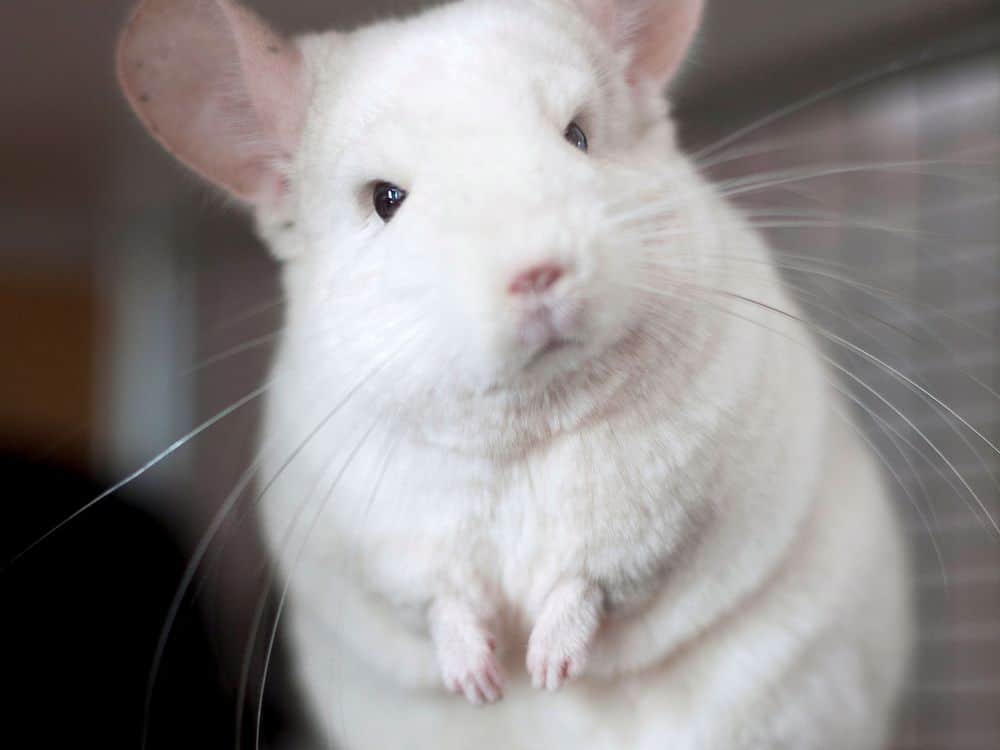
Chinchillas simply take time to adapt to their environment in the early days. They have a number of ingrained defense mechanisms that make them ultra-skittish.
You would be the same way if you were accustomed to constantly running for your life from predators, animals, and even human hunters at one point in time.
It’s just how chinchillas are programmed and wired to behave until they begin feeling comfortable with you. Relax, this skittish phase will be over before you know it.
A Quick Video On Chinchilla Behaviors And Temperaments
I’ve created a quick video where I discuss a chinchilla’s behavior and temperament briefly.
😱 NEWS Flash: The video is short, so you should still read this post, since it contains a majority of what you need to know on this topic.
I purely wanted the visual learners to have something quick to reference as well.
The most significant advice I can give you is to be sure to return to this post and continue scrolling and scanning for all the necessary information.
Not every topic of chinchilla behavior, or even all critical pieces of information, are contained in the video.
Nonetheless, here’s that video that you can see directly below 👇
Now that we have that out of the way, let’s keep moving along.
Chinchilla Personality Traits
A chinchilla has some of the most unique personality traits amongst all rodents, if you ask me.
They are excellent at picking up on habits and routines and are great at communicating with you once trust is built.
I’d say the most dominant personality traits that a chinchilla possesses would be the following.
- High IQ
- Reserved and skittish until comfortable
- Friendly and outgoing once comfortable
- Heavy jumpers and climbers
- Extremely social
Of course, all chinchillas will be a bit different. It’s what makes owning a chinchilla so unique and fantastic.
Overall, the personality traits listed above are extremely common and it shouldn’t take you long to notice these traits and understand where I’m coming from.
A Chinchilla’s Temperature Must Be Monitored
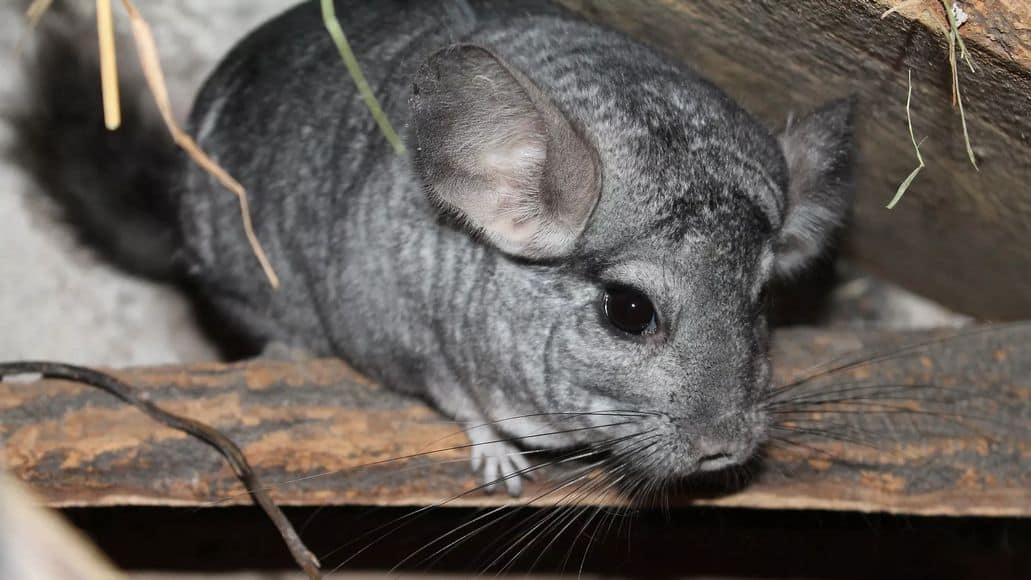
Timid at first, but loving and affectionate after the bond has developed.
The geographical location where chinchillas are used to roaming is also what causes some confusion about certain best practices and why chinchillas need certain temps and habitats to survive.
This is critical for chinchillas.
Chinchillas must be kept at ideal temperatures in your home.
Use items such as chilling pads or even a dehumidifier to help control humidity and temperatures for your chinchilla.
I specifically use these chiller pads for my chinchilla’s cage.
- Made of granite stone to keep chinchillas cool and healthy
- Can be placed anywhere inside chinchilla's home
- 6-Inch long, 10-inch wide
In addition, I use this dehumidifier in my basement near my chinchilla cage to help control the climate even more.
Chinchillas also can’t live outside. Although chinchillas can live outside in the geographical locations we discussed previously, they probably can’t live outside where you live.
The areas in the Andes where they live are known for for mild temperatures with very limited rain. This is a big deal because chinchillas cannot get wet under any circumstances.
This is because of their very dense fur and the chances are that wet fur can lead to your chinchilla becoming very ill.
Now that we are well aware of the origin of chinchillas, it’s important we discuss the specific behaviors that directly impact how great of a family pet they can potentially make.
Additionally, we need to cover the behaviors that will directly impact you the most over the course of your chinchilla ownership.
This leads us directly into one of the most important topics.
Chewing And Biting
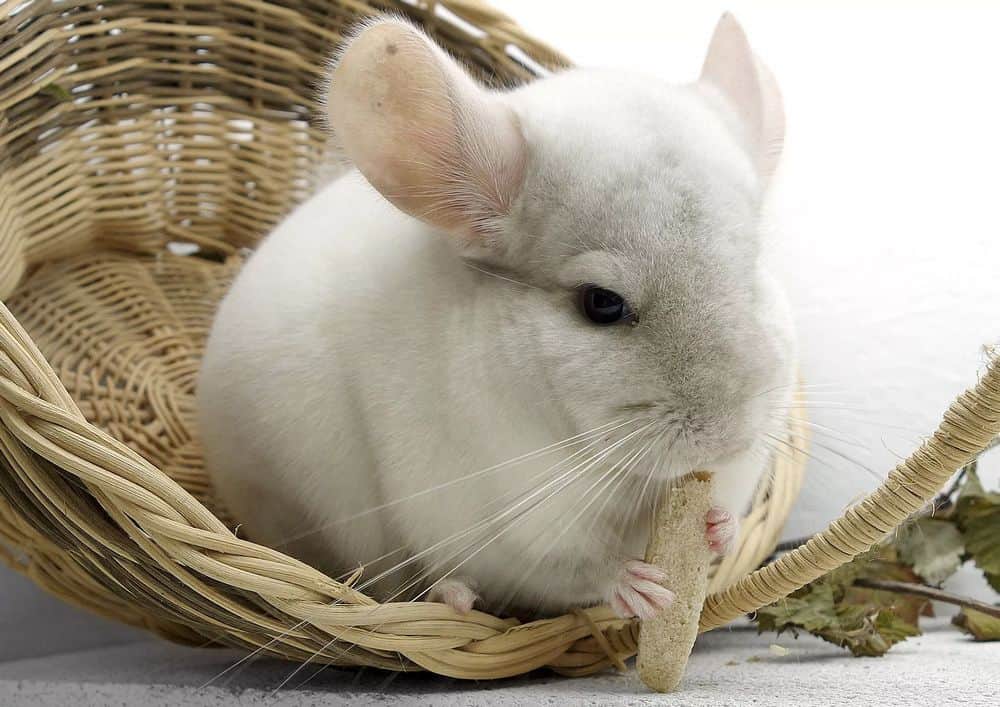
You can’t win every battle. I do have some good news, however. Chinchillas are not known to be frequent biters.
It’s not that chinchillas will never bite, but on the grand scale, chinchillas are not aggressive towards humans.
Unless of course they are mishandled, placed in discomfort, or provoked to do so.
Here are a few examples of when a chinchilla could potentially bite you, but it is still very rare that this would occur:
- Placing your hands in their hiding box attempting to grab them
- Attempting to hold or cuddle too often in the first weeks after adoption
- Improperly picking it up
- Cornering a scared chinchilla
- Non-bonded chinchillas sharing a cage together
Keep my original statement in mind when looking at this list. If you need to learn how to properly socialize a chinchilla, you can view my post here on the topic.
I have personally accidentally done a few of these things and my chinchilla has never attempted to bite me.
However, I have seen enough forum and Facebook group posts over my time scrolling around that I do know that these actions may provoke a nibble from time to time.
If you can effectively avoid doing these things as often as possible, you likely will never have an issue with your chinchilla biting or showing aggression, and you have 15 to 20 years of happiness awaiting you.
As far as chewing, I wish I could say the same, but I can’t. Chinchillas are 100% heavy-duty chewers.
Chinchillas like to chew on just about anything they can find or get their teeth around, like the bars of their cage. You might even find them chewing their own fur.
In fact, promoting healthy chewing with the correct safe items is advised, because their teeth never stop growing throughout their lives.
Not having the ability to file and grind their teeth can cause health problems down the road if it goes ignored or unnoticed.
Don’t Allow Your Chinchilla Around Loose Wires
This is the one spot where you need to be careful. You need to make sure that your chinchilla is never exposed to exposed wires.
Again, chinchillas will chew on nearly anything and this includes wires. Chinchillas need to be kept in a chinchilla proofed room where the wires are protected.
A chinchilla should never have the ability to free roam the house.
Unfortunately, when a chinchilla is outside of its cage, you also need to ensure that it has supervision.
Chinchillas can fit and squeeze into tough places where it may be difficult to locate them if you aren’t paying attention.
My chinchilla loves to burrow in the couch when I’m not paying attention.
Chinchillas are not an animal that should be left outside of the cage without supervision due to these dangers.
Are Chinchillas Aggressive?
No, chinchillas are not aggressive in any fashion. With proper care and proper socialization, a chinchilla will rarely, if ever, show aggression towards you.
However, it is possible that two non-bonded chinchillas may show aggression towards one another without supervision. Are chinchillas territorial then? They can become territorial in captivity.
Natural Abilities And What Chinchillas Prefer To Do
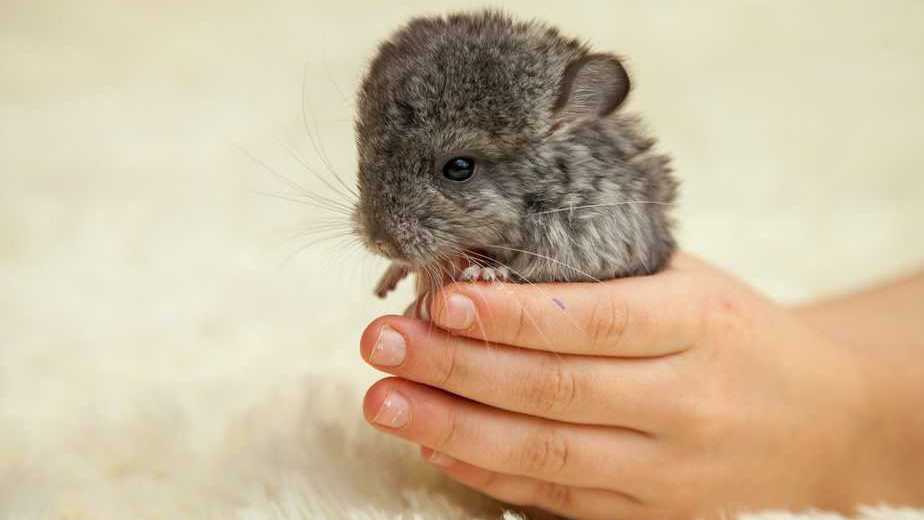
Part of owning a chinchilla means that you take the time to allow your chinchilla to display its natural abilities and act as chinchillas should.
This includes ensuring you have a large enough cage for your chinchilla to jump around inside. This includes making sure the cage is vertically large enough with plenty of shelves.
Chinchillas can jump and they can jump well. When they are happy, they exhibit an especially adorable jumping behavior called popcorning.
Additionally, when you have your chinchilla out for playtime, you need to have an understanding that chinchillas are also master climbers.
This is another big reason to chin-proof the room where you want to interact and have playtime with your chinchilla.
Chinchillas can and will climb as much as possible. Make sure you encourage this. And make sure that your cage encourages this behavior as well.
In a safe manner, of course.
Doing so will only lead to a healthy and happy chinchilla that’s getting adequate movement and exercise daily.
Chinchillas Are Easy to Care For, But Always Be Cautious
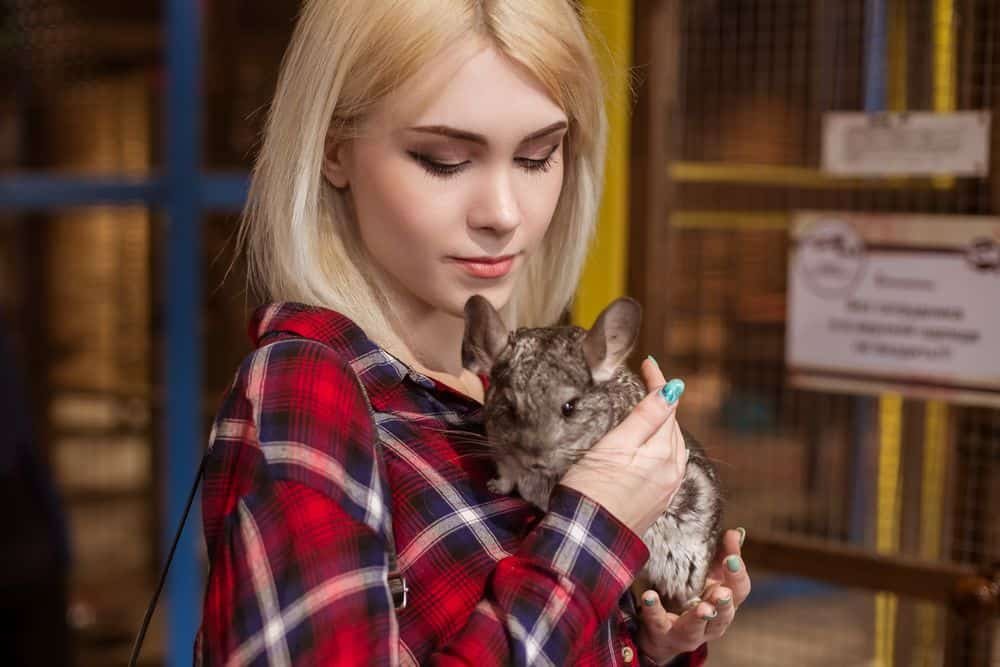
While chinchillas are extremely self-sufficient and easy to care for, they do have a few small requirements.
I often get asked, if I would feel safe leaving my chinchilla alone for the weekend. Yes, it is perfectly fine to leave your chinchilla for the weekend.
As long as it has adequate food and water inside of its cage, it’s likely just fine.
Ensure that your A/C unit in the home is working properly and have a backup plan just in case you need someone to check in on your furry friend.
The worst case is that your chinchilla may be a little upset over the skipped days of playtime.
If you need to leave for the weekend, go for it. No harm in doing so.
Now it’s time to get into the fun stuff and what everyone looks forward too when they embark on the journey to adopt a chinchilla.
The love, bond, and cuddling that may result, if you play your cards correctly.
Affection, Love And The Bond You Can Form
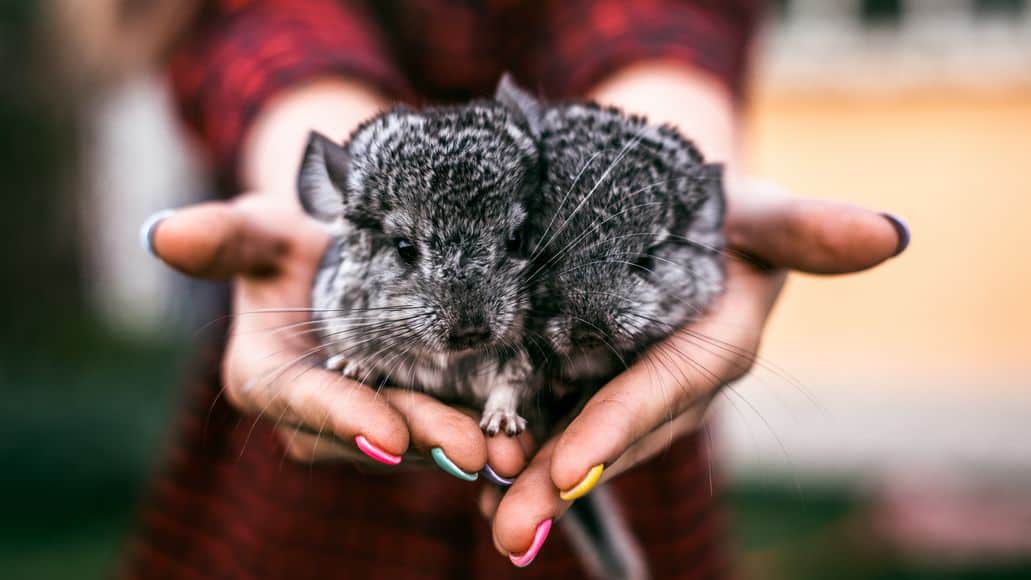
Any time you are discussing a chinchilla’s behaviors, it’s imperative to discuss the loving traits that chins possess.
Let’s make one thing 100% clear. Chinchillas are very affectionate animals.
Once you have established a bond and your chinchilla has warmed up to you, it will begin showing love.
My chinchilla will greet me front and center at her cage bars daily, when I enter the basement.
It wasn’t like this in the beginning.
This took some time of warming up to me and being handled. It took time for her to slowly recognize me as the owner and someone she could feel safe with.
The important thing to remember is that it does happen.
The beginning may feel like an eternity when your chinchilla is shyer and not quite as happy to see you. However, soon, your chinchilla will enjoy being pet, scratched, and be willing to sit in your lap.
If you are curious about the cuddling potential of a chinchilla, you’re in luck because that’s what we are covering next.
Cuddling And Handling A Chinchilla
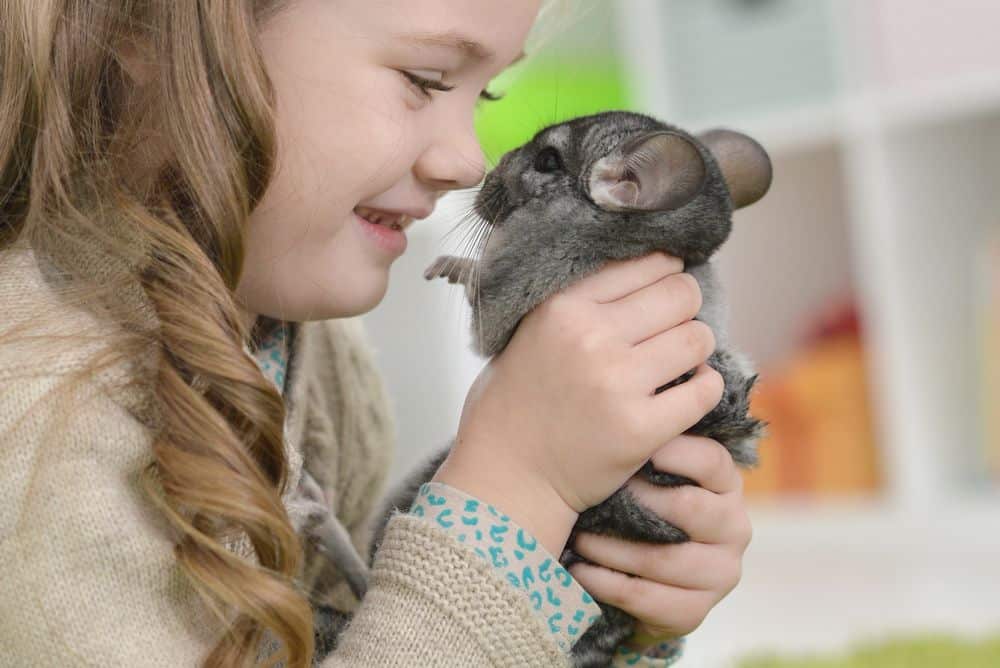
This is when some chinchillas’ owners can become frustrated and impatient in the early stages.
Chinchilla’s are not 100% cuddly animals on the grand scale. Some chinchillas grow into becoming cuddly rodents and some do not.
A lot of this has to do with how your chinchilla was socialized from a young age and how much effort you have put in as well.
Often, I read that chinchillas adopted from pet stores take a tad longer adjusting to being handled, as opposed to chinchillas that came from a reputable breeder who socialized them since birth.
Don’t get me wrong here.
I’m still 100% willing to adopt a chinchilla from a pet store and know for a fact that they would still make excellent family pets.
The bonding phase may simply take a few extra weeks. Simply put, if you have a breeder you can use locally, go for it.
Don’t force the issue or force your chinchilla to cuddle or be handled if they it doesn’t want to. This is a sure-fire way to do nothing more than scare your chinchilla and weaken the bond.
Respect your chinchilla’s space and allow it time to adjust to your smell, touch and physical appearance.
Eventually, your chinchilla will be okay with you handling it. I’ve been through the process myself and dealt with the frustration.
It took time and I had to do the research to learn certain techniques for handling chinchillas to help strengthen the bond and to help my chinchilla feel safe.
This all begins with the proper technique when handling your chinchilla. You see, some chinchillas don’t like being held.
At least not in the beginning.
Some of this can be fixed by purely picking your chinchilla up correctly.
You want to pick them up by the base of the tail. That is an excellent way to make sure your chinchilla feels comfortable with your handling and feels safe while in your arms.
How Social Can You Expect A Chinchilla to Be?
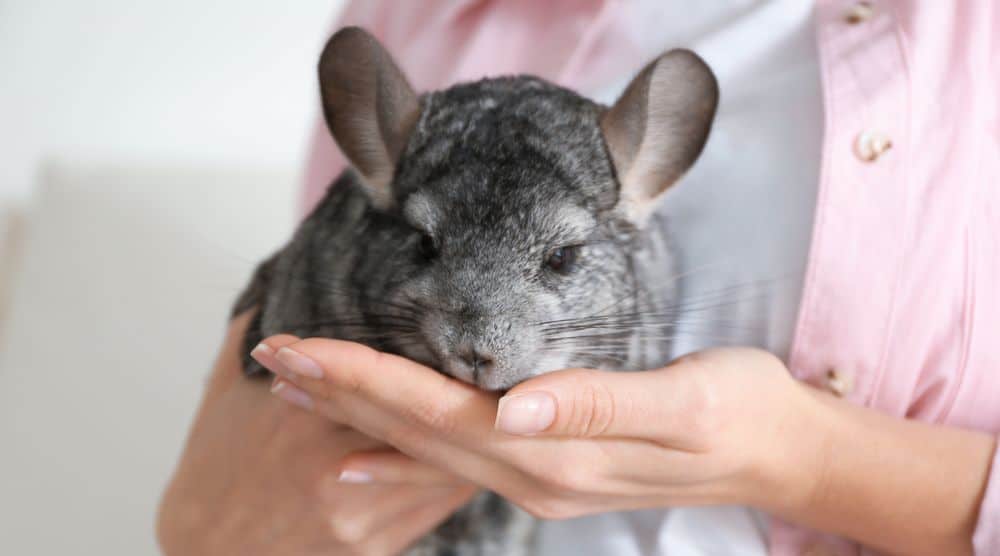
Chinchillas are extremely social animals and you will soon learn this while owning and raising your own chinchilla.
Chinchillas crave attention from you and other chinchillas when possible. Chinchillas are even known to get restless and bored when they are lacking interaction or playtime.
It’s possible to even have depression set in and, in some situations, even jealousy over another chinchilla.
I guess you could say this is a great argument towards the fact that chinchillas really do get lonely.
Chinchillas in the wild are used to running in groups of other chins and when you have built a bond with a chinchilla, they love the time out of the cage that you two spend together.
They look forward to it and, if allowing your chinchilla out for playtime is something you can’t accommodate, it’s likely that you shouldn’t be adopting a chinchilla in the first place.
Chinchillas will even be friendly with family, friends and younger children.
My chinchilla has never been mean to my 2-year-old son, my wife, or any of my other family or friends that want to interact with her and get her out of her cage.
Chinchillas are just meant to be a loving, affectionate, and fantastic pets. Case closed and no arguments about it.
If chinchillas are so friendly with us, how do they act with other chinchillas? I’m glad you asked because that’s what I intend on touching on next.
What About Two Chinchillas Living Together?
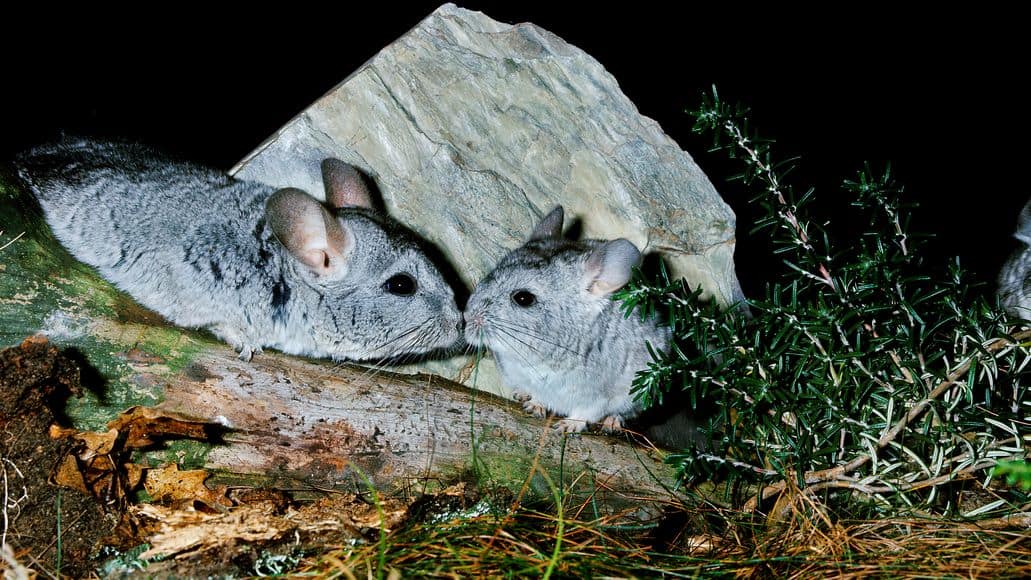
This can become a lot of fun if you do it correctly.
First and most importantly, it’s imperative to know that chinchillas love being around one another if it’s done correctly and the bonding is performed slowly. Otherwise, you can expect them to fight.
Again, chinchillas are extremely social creatures and love interaction. Bonding two chinchillas is a discussion for a separate post, but the point is simple.
Two chinchillas can absolutely live in harmony and share a cage together if you take it slow and perform the bonding process.
In fact, most chinchilla owners venture out to get a second chinchilla.
My biggest recommendation if you plan to do this is to ensure you have a proper-sized chinchilla cage to accommodate both animals.
Something such as the Critter Nation 2 cage would be your best bet.
- Solid and durable construction
- Great size with four levels
- Great platform fit for accessories like fleece liners
- Sits on wheels making cleaning easy
- Under cage storage
- Total of four doors, making access very easy
- Large cage making it unsuitable for tiny spaces
- One of the higher costing cages but for good reason; it is easily the best value for money
I have a full review dedicated to this cage that you can read here and it’s the cage I use for my own chinchilla.
I’m not far from getting a second chin myself, but have really devoted most of my time to learning everything possible about 1 chinchilla first so I can share with all of you.
I do know for a fact that chinchillas do great in pairs.
Now it’s time to touch on the difference between the ladies and the men when it comes to common chinchilla behaviors.
Behavioral Difference Between Males And Females
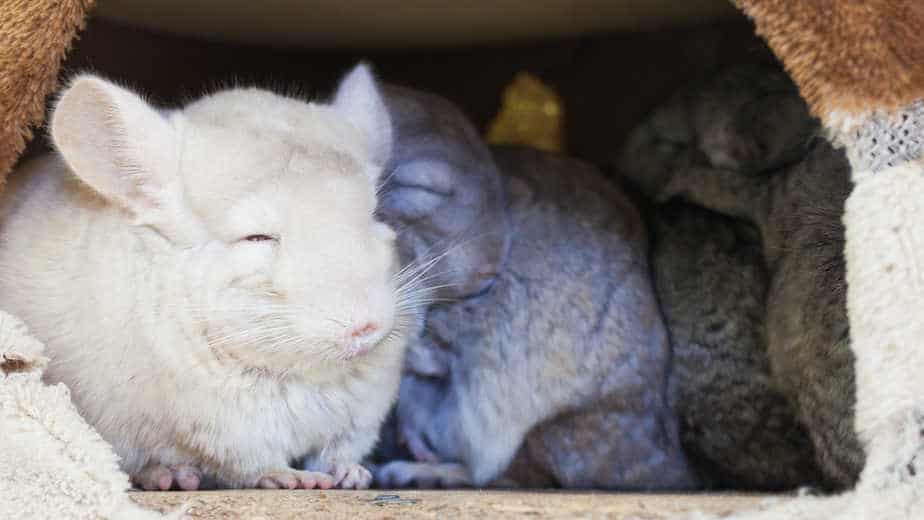
A lot of debate circles around this topic from current and prospective chinchilla owners. In all reality, there isn’t much of a difference between male and female chinchillas and how they behave.
In fact, everything we have discussed thus far into this post is the same with males and females.
One of the biggest differences is clearly the ability for the female chinchilla to reproduce (with the male chinchilla’s help of course).
Additionally, female chinchillas have been known to spray urine from time to time, when they feel threatened or scared.
Female chinchillas will also show an increased amount of energy when they are in heat, which is clearly not a chinchilla behavior that would happen with a male chinchilla.
Outside of these few behaviors that a female chinchilla may display, your chins will likely be one and the same, or close to it.
Both male and female chinchillas are capable of showing love, being affectionate, and loving you in the same fashion. It just takes a little time and bonding for everything to come to fruition.
Does Pregnancy Impact A Chinchilla’s Behavior?
Pregnancy does not especially impact the female chinchilla’s behavior. As we mentioned previously, a female chinchilla in heat is going to be more energetic.
Additionally, female and male chinchillas, when attempting to mate, may enjoy chasing each other around more than usual.
But when pregnant, a female chinchilla won’t act much differently.
Bad Behaviors A Chinchilla May Display
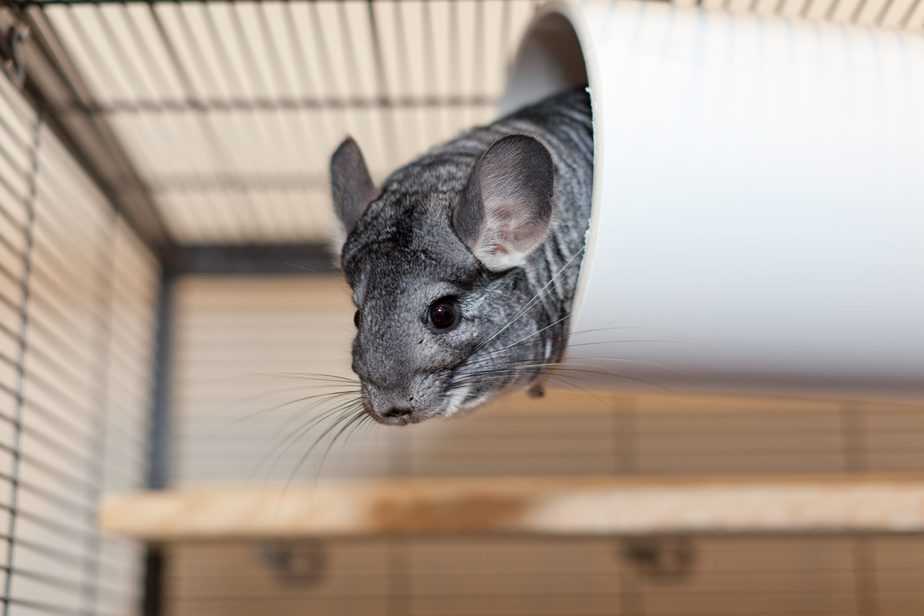
Now we get into some of the less desirable traits you may experience as a chinchilla owner.
Breathe easy because it’s not a long list.
However, chinchillas do have a few traits about them that can be frustrating at times. We have already touched on some of them.
It’s always imperative to only use one room of your home and ensure the room is safe.
This is because no matter how much love your chinchilla has for you, they are naturally prone to run away and find a nice dark hiding spot.
The good news is that it is you can train a chinchilla to come back to you fairly easily using its dust bath.
Additionally, chinchillas can get irritated with a lack of social interaction, which is why I pointed out that you should not adopt a chinchilla unless you are positive you can interact and spend time with it.
Outside of this, the biggest concern is chewing. Chinchillas will always be a chewing animal and love to chew anything. Their chewing can destroy things you do not want destroyed, so make sure you give your pet plenty of things to chew on.
I have owned my chinchilla for quite some time and I honestly can’t think of any other behaviors that are frustrating or non-desirable.
For the most part, chinchillas are extremely unique and awesome pets to own and I recommend chinchillas as a family pet 100%.
Sleeping Behaviors With Chinchillas
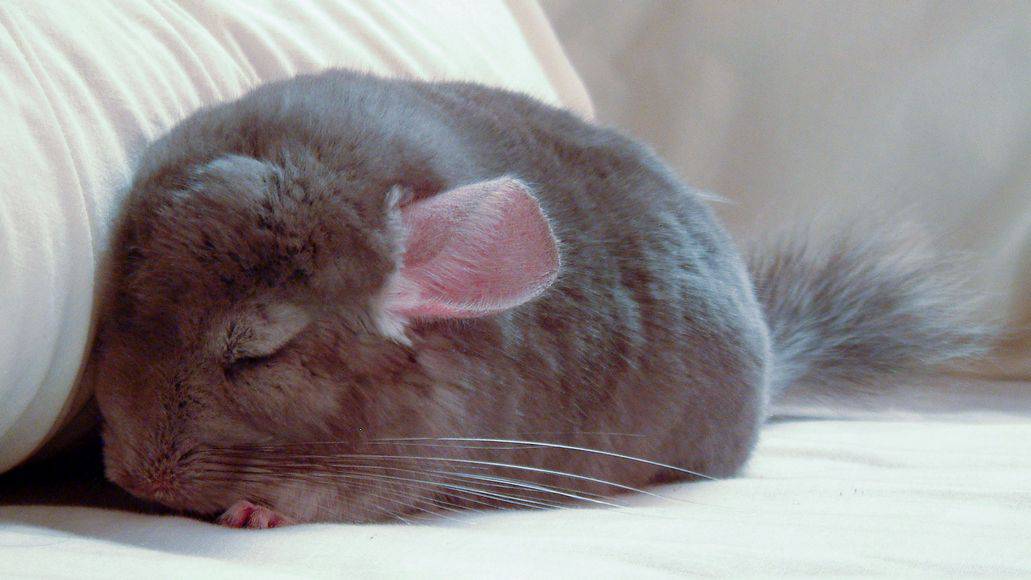
Surprisingly enough, this is a hot topic when it comes to owning or adopting a chinchilla. Potentially new chinchilla owners want to know when these furballs like to go to sleep.
Well, chinchillas are crepuscular (though many believe them to be nocturnal, which is similar) which means that they are most energetic and active two times per day.
Dusk and dawn.
Outside of these times, you can expect your chinchilla to lie around motionless except for breathing and sleep a substantial amount of the day.
If you want to know more of those specifics, you can read my post about how many hours a day chinchillas sleep.
Now, I can’t speak for all chinchilla owners, but what I love about my chinchilla is the fact that she is willing to play and interact nearly any time of the day.
Ideally, I stick to her prime times, like early evening or early morning, but life doesn’t always work like this.
If I enter the room, she’s up and ready to interact.
Additionally, for the most part, your chinchilla will sleep however it chooses, and this varies based on your specific pet.
Mine likes to sleep in her hiding box. Every now and then, I will catch her sleeping in her hammock.
I have also noticed that my chinchilla is most active at night, even past sunset. They can be noisy at night, which is why it is best to not keep them in your bedroom.
I typically dim the lights in the basements and she tends to enjoy it with a little less of the bright lights and begins chewing on her various hanging items in her cage and running around more freely.
Don’t turn off your lights completely, however.
I have a post about how chinchillas can see in the dark to some extent, much like humans, but it’s always better to leave some light on to allow them to navigate their cage a bit more safely.
You also don’t need to be present during these night time fun times with your chinchilla.
If your chinchilla is in its cage and supplied with adequate food and water, it doesn’t need much supervision.
For the most part, it may act a bit crazy and hop around but not much else takes place.
If you need reassurance on this topic, feel free to check out my post about what chinchillas do at night.
It breaks down the topic in more depth and perhaps will relieve a tad bit of anxiety for you.
Your chinchilla may not even sleep in these manners discussed previously. Some sleep with their ears down and some up. Other behaviors can vary greatly, too. So much so that I needed a dedicated post to discuss in-depth how chinchillas sleep.
Happy Chinchilla Behavior And How To Recognize It
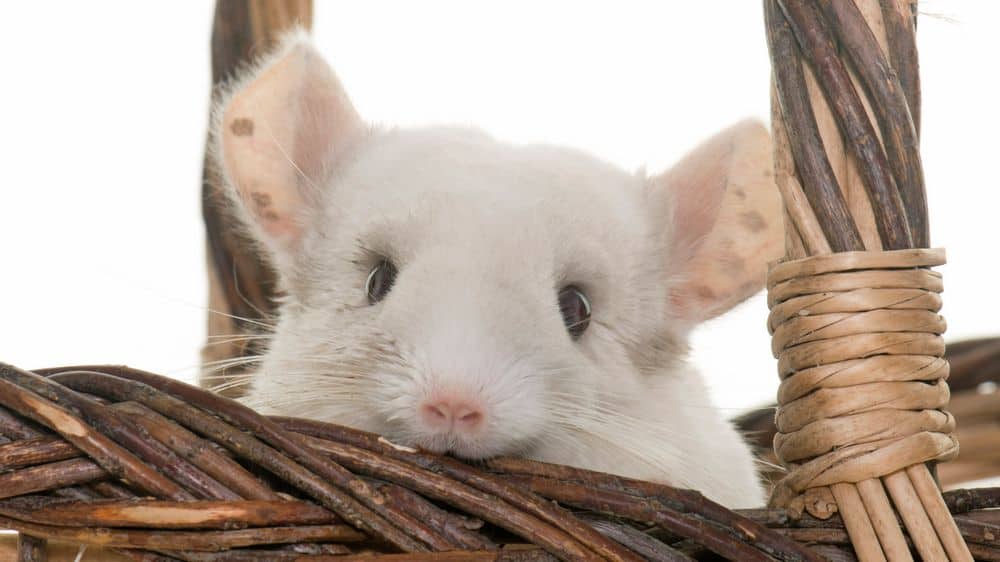
A happy chinchilla doesn’t take much to recognize. The body language is pretty obvious. Some of it is even eerily similar to ours, like winking. For the most part, it will just be a chinchilla springing with energy, happy to see you, and enjoying a nice dust bath or time out of the cage.
In almost all circumstances, a chinchilla will display these happy behaviors assuming they aren’t falling victim to any illnesses.
They may also emit certain noises when they are happy (or when they are feeling other emotions as well). You will sometimes even find them holding things they like.
Some Noises You Can Expect From Your Chinchilla
The noises you can expect from your chinchilla are also going to vary greatly from chinchilla to chinchilla in different circumstances.
For instance, my 1-year old female likes to bark and also let out some squeaks from time to time.
My chinchilla primarily barks if I’m in the room and working and not letting her out for playtime. It’s her way of letting me know “hey, I’m waiting to come out and play”.
Additionally, she will often make a purr or squeak type noise when I scratch her ears or under her chin.
This I have decided is the sound she makes when she’s happy and relaxed. However, as I said, chinchillas can make noises for different reasons.
You will slowly learn about what makes your chinchilla happy or displeased and likely it will have a noise that goes hand in hand with this situation.
Chinchillas are just known to act a bit crazy, make sounds, and even display physical attributes such as shaking at times depending on their environment.
It’s part of what makes owning a chinchilla so much fun.
I also have a full post about chinchilla barking and other noises that you can see here if you are wanting further information on this specific topic.
It does a good job breaking down several more noises that you can expect from your chinchilla.
How To Provide Adequate Care For Your Chinchilla
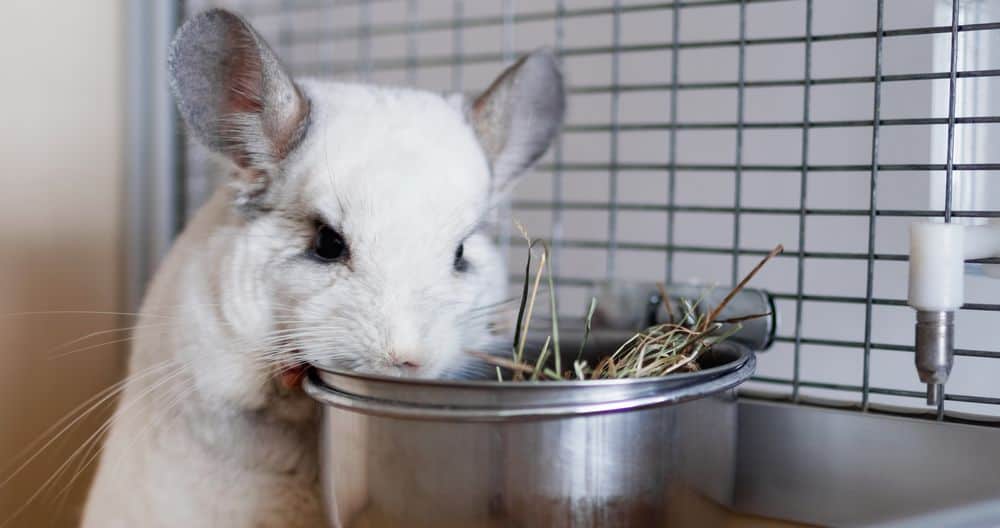
Alright, loyal readers. Here’s where the rubber hits the road. You need to understand one thing that is very important.
Here it is.
Whoever says chinchillas are hard to take care of, are 100% incorrect.
I have extreme OCD and an extremely demanding job.
I do have the luxury of working from home, but did not have the time or patience for an animal that would require a ton of work.
In fact, I adopted my chinchilla originally because my son and my 7-year-old yellow lab are legitimately best friends.
I know my dog is getting up there in age and I have owned Labradors in the past.
I know how the story ends and I wanted my son to begin making a new friend with a pet that’s easy to care for.
Additionally, I wanted a pet he could interact with and learn responsibility.
When you factor in how clean I prefer my house to be and how limited my schedule is, you can trust me that chinchillas are not difficult to manage.
Do they require some love and affection?
Yes, what animals don’t require love and affection?
Do you need to clean their cage once a week or twice? Yes. Don’t you also have to change a cat’s litter box or walk (and pick up after) your dog?
I think you see my point.
How To Prepare For A Chinchilla In 5 Easy Steps
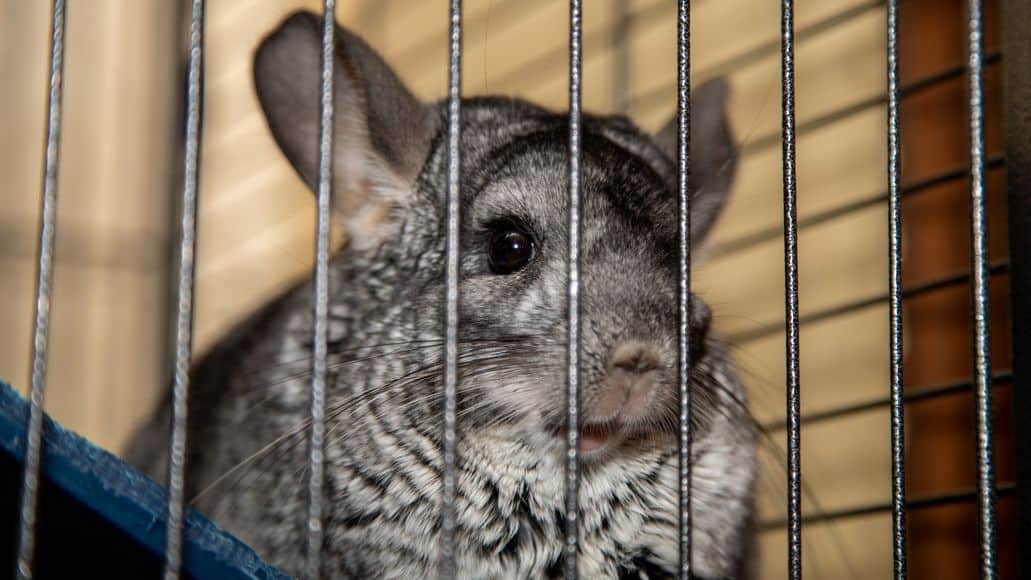
I’m going to make this as easy as possible and wrap up this section of this post.
Here’s how to prepare for your chinchilla in the plainest English and most simple to understand fashion.
- Step 1: Save $300.00. This covers an adequate cage and your initial cost.
- Step 2: Chin proof one room. This can be a bathroom if need be. Protect and cover the wires.
- Step 3: Plan to spend 30-60 minutes interacting with your chinchilla every day
- Step 4: Clean your chinchilla cage 1-2 times per week (invest in fleece liners to make this easier)
- Step 5: Keep your chinchilla fed with the correct pellets, hay, and fresh water.
Seriously people. That’s it.
Is there more to it?
Of course, I could write on this topic all day but in the grand scheme of things, these are the 5 steps that will provide you 15 to 20 years of a bond with a great pet, assuming you don’t run into any illnesses or other unfortunate circumstances.
Now, let’s move on and wrap up a few final points so I can send you on your way before you run out of coffee and get irritated with me.
Being Prepared And Proofing Your Home In Advance
I know we already touched on this, but I just wanted to provide a bit more info on how to prepare for a chinchillas behavior.
Let’s assume you are adopting a chinchilla tomorrow.
Start today by ordering wire protectors for the room where you intend on allowing your chinchilla to play.
If need be, scroll back to up my link to my blog post about chinchillas chewing wires. I mention the exact wire protectors I purchased from Amazon in that post.
Next, you need to order your chinchilla cage.
Clearly, it’s advised to find the best chinchilla cage possible with adequate size.
Go ahead and order this and get it to your home. My recommendation is the Critter Nation 2. You can also trust your breeder with recommendations.
Ask your breeder about your chinchillas’ specific behaviors, social skills, and how aggressive/friendly your chinchilla is.
I asked my breeder hundreds of questions and everything else I googled just like you are right now.
Outside of this, get the common-sense type items for chinchillas such as the food, bowls, and water bottles.
This is really all you need to do to prepare. It’s going to be okay and gets easier each day.
Chinchillas Are Unique And Smart Animals
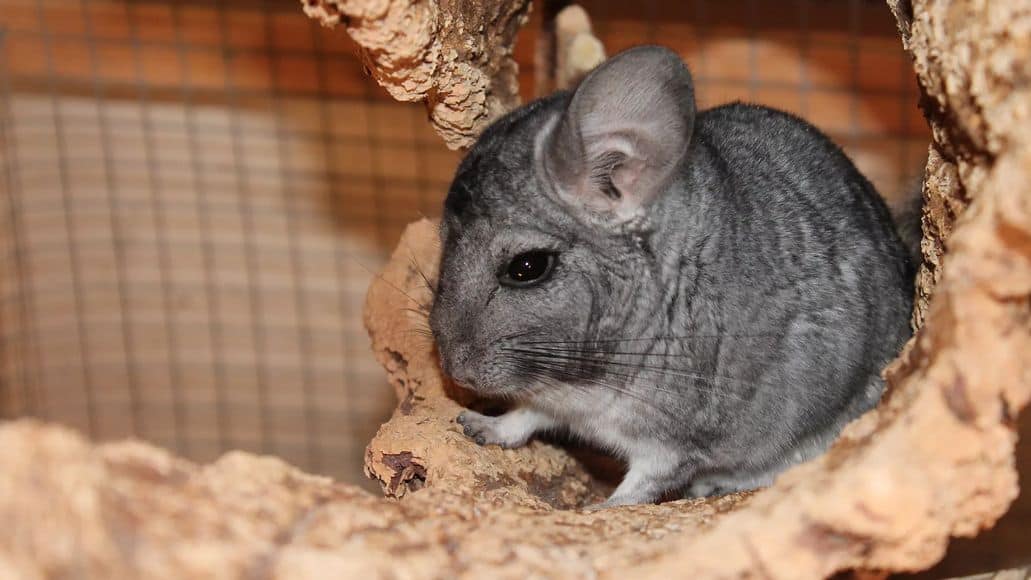
This is often overlooked, and I personally find it sad that it is. It’s overlooked because I don’t think as many believe in adopting a chinchilla as I would like to see.
However, chinchillas are smart animals. So smart that they recognize timing, habits, and patterns. They understand when it’s time to come play.
My chinchilla even is learning potty training at the moment (for pee, not poop, unfortunately, since they poop a poop-load and often even eat their poop).
Additionally, my chinchilla knows exactly the pocket I often keep a treat or two on standby and even responds to name-calling.
No, this didn’t happen right away, but it did happen with enough time and interaction.
This is another reason that chinchillas make great pets and one of the most significant reasons why I recommend adopting a chinchilla as soon as possible.
Don’t Worry People: Chinchillas Are Not Hard To Care For
The last thing I wanted to emphasize one more time is to breathe easy.
Chinchillas, for the third time in this post, are not hard to care for. They are easy, loving, and friendly pets.
Chinchillas are also very cheap to own and not expensive at all, which is clearly a big benefit as well. There may be some problems if you own another pet that naturally hunts chinchillas, like a cat. Read “Do Chinchillas Get Along With Cats?” for more.
Take a breath and get ready for a lot of fun and happy moments soon. My chinchilla still finds ways to express her behavior and make me smile every day.
It’s truly a great pet to own.
Chinchilla Behavior And Temperament: Final Thoughts
Alright, loyal readers.
If you read to this point, I appreciate you greatly and hope you gained some insight into common chinchilla behaviors.
That was my main goal in this post.
Additionally, if you didn’t find the specifics you needed, be sure to use the links throughout the post to navigate to specific topics for even more in-depth information.
Outside of this information, all I can do is reassure you that chinchillas are fantastic and 100% worth owning.
If you are the fence currently, get out there and get the adoption taken care of. Just make sure you report back and share your stories.
Share your thoughts, concerns, and stories about chinchilla behavior.
Speaking of that, do you feel I left out anything important about a chinchilla’s behaviors? Have you experienced anything not touched on in this post?
If so, be sure to share your comments and stories below.
If not, me and “chili” appreciate you, and thanks for stopping by. See you next time.



Amy says
I have been a bunny mom since 2013. Someone my husband works with is giving away her chinchilla as it’s bondmate passed away and the human “has no time” for it anymore. 😔 I’m voraciously reading every bit of this website for info since my husband and I are going to give this fur baby a home. (I can’t have human kids and adopting humans is too expensive for us.) Of course I already have an exotic vet, and buy hay regularly my 12 year old bun, so I know good hay compared to bad, but a lot of this info I didn’t know about. Just wanted to say thank you for putting this info out there. It’s really well written and I appreciate it!
Yes Or No Spinner says
I really enjoyed this post! It was very informative and I learned a lot about chinchillas. I especially liked the section on surprises and what to expect. It was very helpful.
Krystal says
How can I get more advice please ?